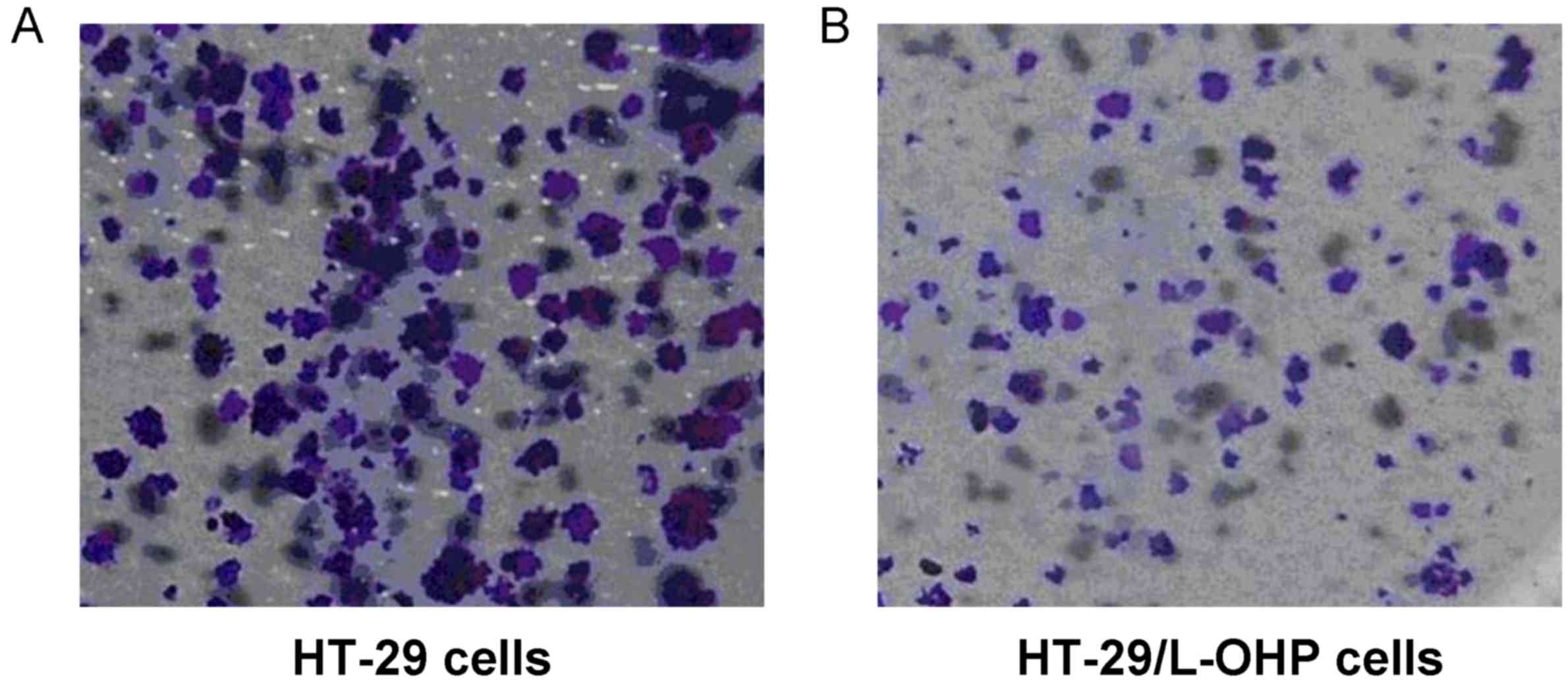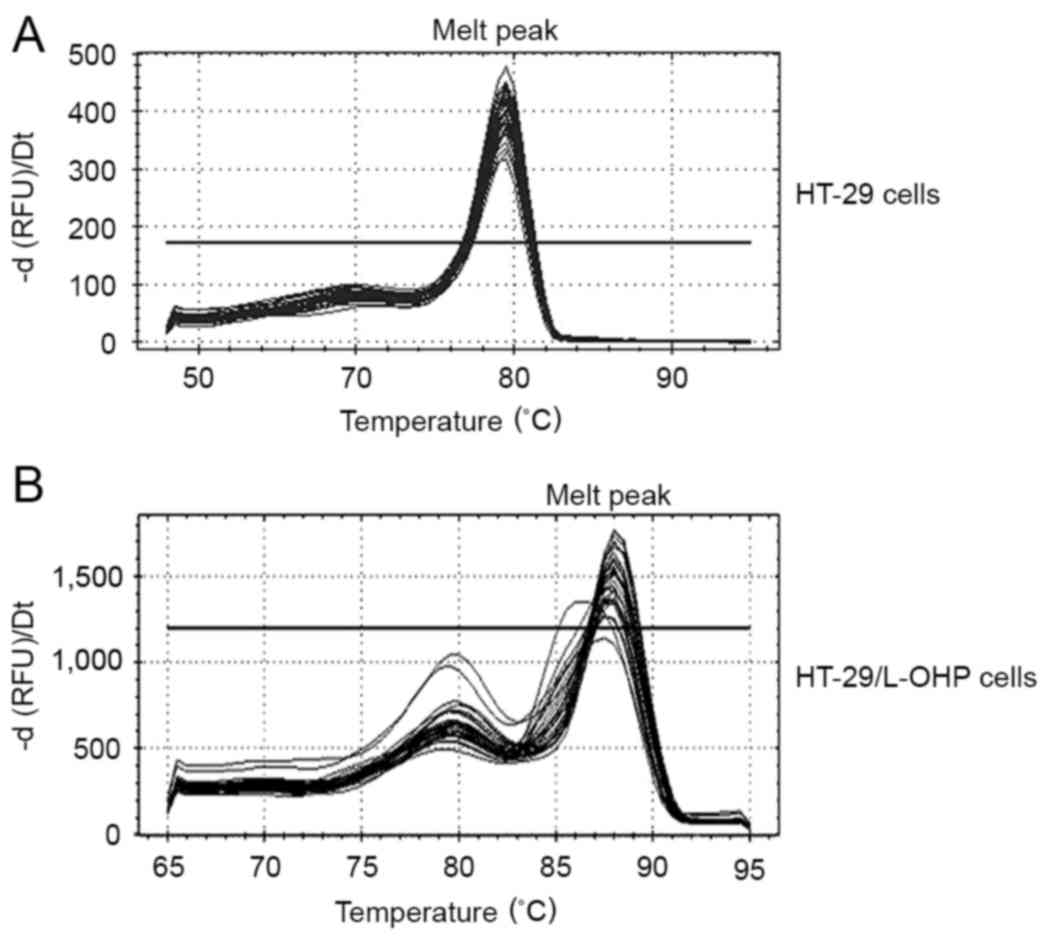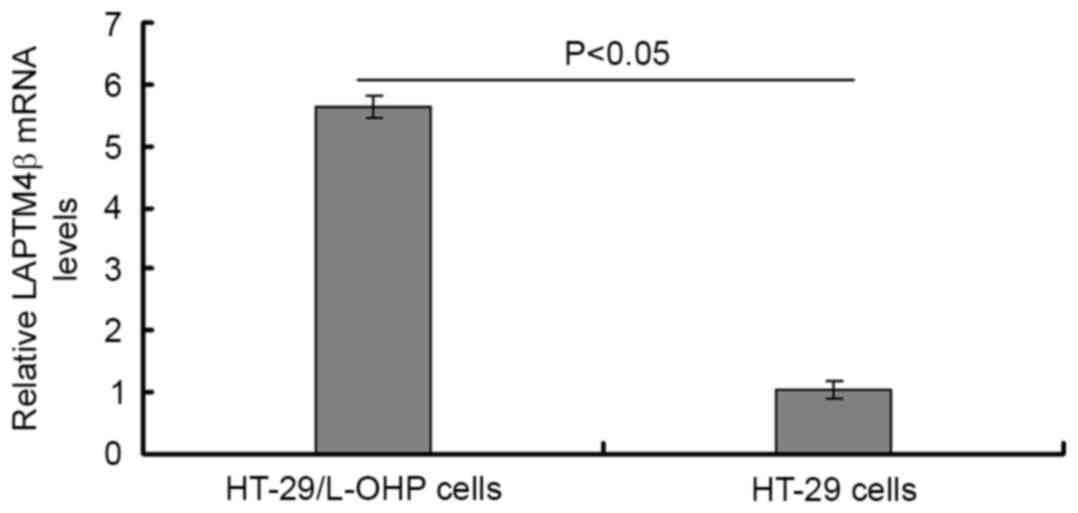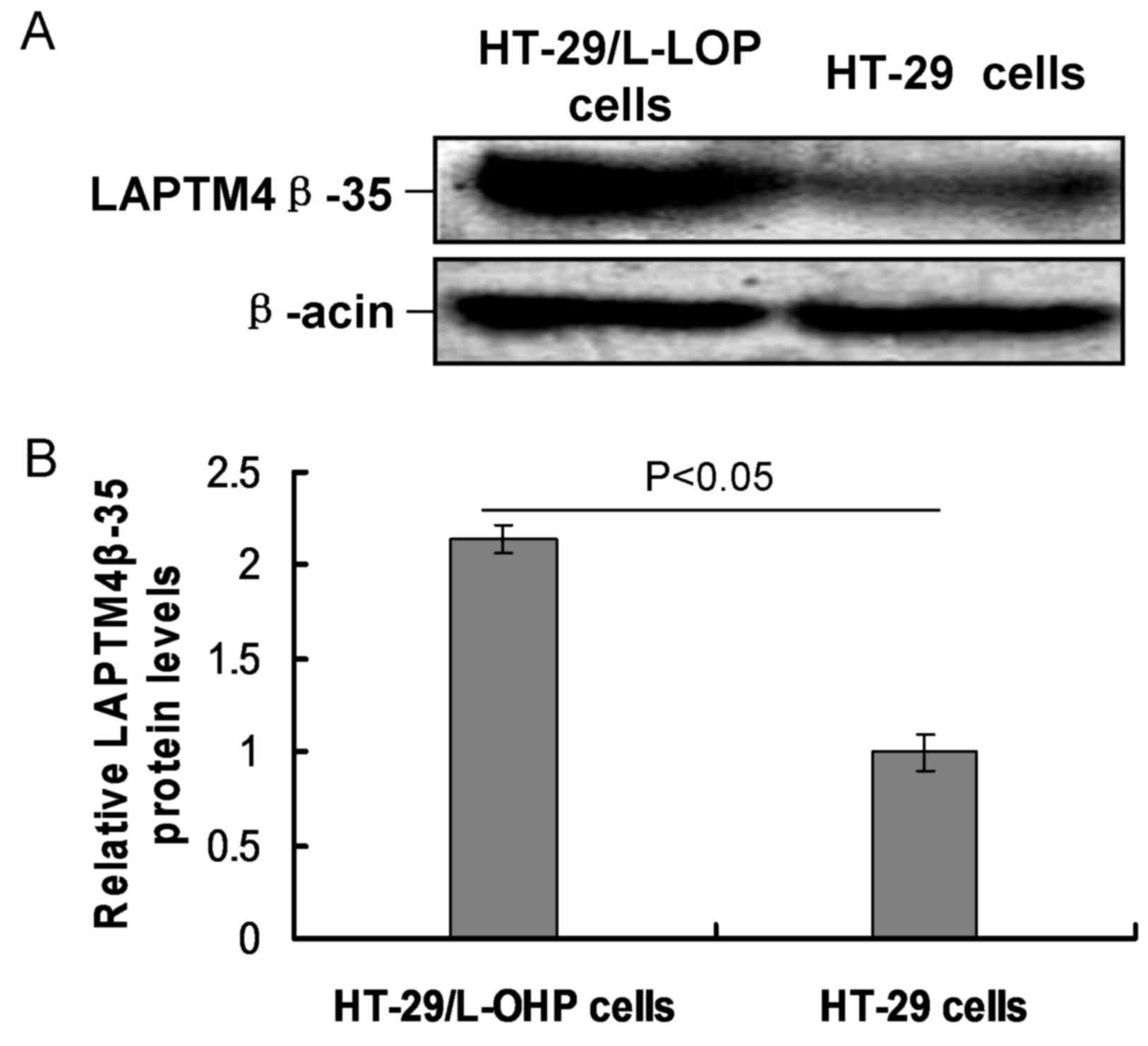|
1
|
Takahashi K, Hosokawa M, Kasajima H,
Hatanaka K, Kudo K, Shimoyama N and Miyashita K: Anticancer effects
of fucoxanthin and fucoxanthinol on colorectal cancer cell lines
and colorectal cancer tissues. Oncol Lett. 10:1463–1467.
2015.PubMed/NCBI
|
|
2
|
Geryk E, Horváth T and Konecný M: The
expected worldwide burden of oesophagus, stomach and colorectal
cancers. Vnitr Lek. 57:1006–1011. 2011.(In Czech). PubMed/NCBI
|
|
3
|
Bahl R, Arora S, Nath N, Mathur M, Shukla
NK and Ralhan R: Novel polyumorphism in p21(waf1/cip1) cyclin
dependent kinase inhibitor gene: Association with human esophageal
cancer. Oncogene. 19:323–328. 2000. View Article : Google Scholar : PubMed/NCBI
|
|
4
|
Klintrup K, Mäkinen JM, Kauppila S, Väre
PO, Melkko J, Tuominen H, Tuppurainen K, Mäkelä J, Karttunen TJ and
Mäkinen MJ: Inflammation and prognosis in colorectal cancer. Eur J
Cancer. 41:2645–2654. 2005. View Article : Google Scholar : PubMed/NCBI
|
|
5
|
Ginés A, Bystrup S, de Porras Ruiz V,
Guardia C, Musulén E, Martínez-Cardús A, Manzano JL, Layos L, Abad
A and Martínez-Balibrea E: PKM2 subcellular localiczation is
involved in oxaliplatin resistance acquisition in HT29 human
colorectal cancer cell lines. PLoS One. 10:e01238302015. View Article : Google Scholar : PubMed/NCBI
|
|
6
|
Cunningham D, Atkin W, Lenz HJ, Lynch HT,
Minsky B, Nordlinger B and Starling N: Colorectal cancer. Lancet.
375:1030–1047. 2010. View Article : Google Scholar : PubMed/NCBI
|
|
7
|
Weitz J, Koch M, Debus J, Höhler T, Galle
PR and Büchler MV: Colorectal cancer. Lancet. 365:153–165. 2005.
View Article : Google Scholar : PubMed/NCBI
|
|
8
|
Kelland L: The resurgence of
platinum-based cancer chemotherapy. Nat Rev Cancer. 7:573–584.
2007. View
Article : Google Scholar : PubMed/NCBI
|
|
9
|
Shao GZ, Zhou RL, Zhang QY, Zhang Y, Liu
JJ, Rui JA, Wei X and Ye DX: Molecular cloning and characterization
of LAPTM4B, a novel gene upregulated in hepatocellular carcinoma.
Oncogene. 22:5060–5069. 2003. View Article : Google Scholar : PubMed/NCBI
|
|
10
|
Kasper G, Vogel A, Klaman I, Gröne J,
Petersen I, Weber B, Castaños-Vélez E, Staub E and Mennerich D: The
human LAPTM4b transcript is upregulated in various types of solid
tumours and seems to play a dual functional role during tumour
progression. Cancer Lett. 224:93–103. 2005. View Article : Google Scholar : PubMed/NCBI
|
|
11
|
Hogue DL, Kerby L and Ling V: A mammalian
lysosomal membrane protein confers multidrug resistance upon
expression in Saccharomyces cerevisiae. J Biol Chem.
274:12877–12882. 1999. View Article : Google Scholar : PubMed/NCBI
|
|
12
|
Li L, Wei XH, Pan YP, Li HC, Yang H, He
QH, Pang Y, Shan Y, Xiong FX, Shao GZ and Zhou RL: LAPTM4B: A novel
cancer-associated gene motivates multidrug resistance through
efflux and activating PI3K/AKT signaling. Oncogene. 29:5785–5795.
2010. View Article : Google Scholar : PubMed/NCBI
|
|
13
|
Li Y, Zou L, Li Q, Haibe-Kains B, Tian R,
Li Y, Desmedt C, Sotiriou C, Szallasi Z, Iglehart JD, et al:
Amplification of LAPTM4B and YWHAZ contributes to chemotherapy
resistance and recurrence of breast cancer. Nat Med. 16:214–218.
2010. View
Article : Google Scholar : PubMed/NCBI
|
|
14
|
Milkereit R and Rotin D: A role for the
ubiquitin ligase Nedd4 in membrane sorting of LAPTM4 proteins. PLoS
One. 6:e274782011. View Article : Google Scholar : PubMed/NCBI
|
|
15
|
Xia LZ, Yin ZH, Ren YW, Shen L, Wu W, Li
XL, Guan P and Zhou BS: The relationship between LAPTM4B
polymorphisms and cancer risk in Chinese Han population: A
meta-analysis. Springerplus. 4:1792015. View Article : Google Scholar : PubMed/NCBI
|
|
16
|
Kang Y, Yin M, Jiang W, Zhang H, Xia B,
Xue Y and Huang Y: Overexpression of LAPTM4B-35 is associated with
poor prognosis in colorectal carcinoma. Am J Surg. 204:677–683.
2012. View Article : Google Scholar : PubMed/NCBI
|
|
17
|
Jensen NF, Stenvang J, Beck MK, Hanáková
B, Belling KC, Do KN, Viuff B, Nygård SB, Gupta R, Rasmussen MH, et
al: Establishment and characterization of models of chemotherapy
resistance in colorectal cancer: Towards a predictive signature of
chemoresistance. Mol Oncol. 9:1169–1185. 2015. View Article : Google Scholar : PubMed/NCBI
|
|
18
|
Livak KJ and Schmittgen TD: Analysis of
relative gene expression data using real-time quantitative PCR and
the 2(-Delta Delta C(T)) method. Methods. 25:402–408. 2001.
View Article : Google Scholar : PubMed/NCBI
|
|
19
|
Crea F, Nobili S, Paolicchi E, Perrone G,
Napoli C, Landini I, Danesi R and Mini E: Epigenetics and
chemoresistance in colorectal cancer: An opportunity for treatment
tailoring and novel therapeutic strategies. Drug Resist Updat.
14:280–296. 2011. View Article : Google Scholar : PubMed/NCBI
|
|
20
|
Pasquier E, Kavallaris M and André N:
Metronomic chemotherapy: New rational for new directions. Nat Rev
Clin Oncol. 7:455–465. 2010. View Article : Google Scholar : PubMed/NCBI
|
|
21
|
Joyce H, McCann A, Clynes M and Larkin A:
Influence of multidrug resistance and drug transport proteins on
chemotherapy drug metabolism. Expert Opin Drug Metab Toxicol.
11:795–809. 2015. View Article : Google Scholar : PubMed/NCBI
|
|
22
|
Bhirde AA, Chikkaveeraiah BV, Srivatsan A,
Niu G, Jin AJ, Kapoor A, Wang Z, Patel S, Patel V, Gorbach AM, et
al: Targeted therapeutic nanotubes influence the viscoelasticity of
cancer cells to overcome drug resistance. ACS Nano. 8:4177–4189.
2014. View Article : Google Scholar : PubMed/NCBI
|
|
23
|
Larsen AK, Escargueil AE and Skladanowski
A: Resistance mechanisms associated with altered intracellular
distribution of anticancer agents. Pharmacol Ther. 85:217–229.
2000. View Article : Google Scholar : PubMed/NCBI
|
|
24
|
Gottesman MM: Mechanisms of cancer drug
resistance. Ann Rev Med. 53:615–627. 2002. View Article : Google Scholar : PubMed/NCBI
|
|
25
|
Cheng XJ, Xu W, Zhang QY and Zhou RL:
Relationship between LAPTM4B gene polymorphism and susceptibility
of colorectal and esophageal cancers. Ann Oncol. 19:527–532. 2008.
View Article : Google Scholar : PubMed/NCBI
|
|
26
|
Cheng X, Zheng Z, Bu Z, Wu X, Zhang L,
Xing X, Wang X, Hu Y, Du H, Li L, et al: LAPTM4B-35, a cancer
related gene, is associated with poor prognosis in TNM stages I–III
gastric cancer patients. PLoS One. 10:e01215592015. View Article : Google Scholar : PubMed/NCBI
|
|
27
|
Zhang H, Wei Q, Liu R, Qi S, Liang P, Qi
C, Wang A, Sheng B, Li L and Xu Y: Overexpression of LAPTM4B-35: A
novel marker of poor prognosis of prostate cancer. PLoS One.
9:e910692014. View Article : Google Scholar : PubMed/NCBI
|
|
28
|
Meng F, Luo C, Hu Y, Yin M, Lin M, Lou G
and Zhou R: Overexpression of LAPTM4B-35 in cervical carcinoma: A
clinicopathologic study. Int J Gynecol Pathol. 29:587–593. 2010.
View Article : Google Scholar : PubMed/NCBI
|
|
29
|
Yang H, Xiong F, Qi R, Liu Z, Lin M, Rui
J, Su J and Zhou R: LAPTM4B-35 is a novel prognostic factor of
hepatocellular carcinoma. J Surg Oncol. 101:363–369. 2010.
View Article : Google Scholar : PubMed/NCBI
|
|
30
|
Lee JT Jr, Steelman LS and McCubrey JA:
Phosphatidylinositol 3′-kinase activation leads to multidrug
resistance protein 1 expression and subsequent chemoresistance in
advanced prostate cancer cells. Cancer Res. 64:8397–8404. 2004.
View Article : Google Scholar : PubMed/NCBI
|
|
31
|
Knuefermann C, Lu Y, Liu B, Jin W, Liang
K, Wu L, Schmict M, Mills GB, Mendelsohn J and Fan Z:
HER2/PI-3K/Akt activation leads to a multidrug resistance in human
breast adenocarcinoma cells. Oncogene. 22:3205–3212. 2003.
View Article : Google Scholar : PubMed/NCBI
|
|
32
|
Abdul-Ghani R, Serra V, Györffy B,
Jürchott K, Solf A, Dietel M and Schäfer R: The PI3K inhibitor
LY294002 blocks drug export from resistant colon carcinoma cells
overexpressing MRP1. Oncogene. 25:1743–1752. 2006. View Article : Google Scholar : PubMed/NCBI
|
|
33
|
Rad SM, Langroudi L, Kouhkan F, Yazdani L,
Koupaee AN, Asgharpour S, Shojaei Z, Bamdad T and Arefian E:
Transcription factor decoy: A pre-transcriptional approach for gene
downregulation purpose in cancer. Tumour Biol. 36:4871–4881. 2015.
View Article : Google Scholar : PubMed/NCBI
|
|
34
|
Barancík M, Bohácová V, Sedlák J, Sulová Z
and Breier A: LY294,002, a specific inhibitor of PI3K/Akt kinase
pathway, antagonizes P-glysoprotein-mediated multidrug resistance.
Eur J Pharm Sci. 29:426–434. 2006. View Article : Google Scholar : PubMed/NCBI
|
|
35
|
Li Y, Zhou L, Li Q, Haibe-Kains B, Tian R,
Li Y, Desmedt C, Sotiriou C, Szallasi Z, Iglehart JD, et al:
Amplification of LAPTM4B and YWHAZ contributes to chemotherapy
resistance and recurrence of breast cancer. Nat Med. 16:214–218.
2010. View
Article : Google Scholar : PubMed/NCBI
|
|
36
|
Tan X, Thapa Q, Sun Y and Anderson RA: A
kinase-independent role for EGF receptor in autophagy initiation.
Cell. 160:145–160. 2015. View Article : Google Scholar : PubMed/NCBI
|
|
37
|
Li Y, Zhang Q, Tian R, Wang Q, Zhao JJ,
Iglehart JD, Wang ZC and Richardson AL: Lysosomal transmembrane
protein LAPTM4B promotes autophagy and tolerance to metabolic
stress in cancer cells. Cancer Res. 71:7481–7489. 2011. View Article : Google Scholar : PubMed/NCBI
|



















